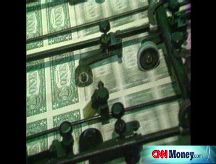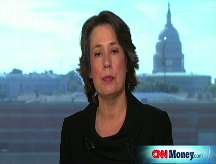Bank rescue will take time to work
Pumping $250B into banks may have been the right call but supporters concede it will take a while for credit to start flowing again and the economy to recover.
NEW YORK (CNNMoney.com) -- The latest version of the bank bailout plan may be getting more support than others but even those who think it's a good idea say it won't lead to a quick economic turnaround.
The Bush administration announced Tuesday that it plans to invest $250 billion in the nation's banks, with nine of the largest banks receiving about half of that amount.
While this and other moves announced Tuesday should help convince banks to start lending to one another more freely, economic experts caution that the thawing of the credit markets will be a relatively slow process. It will take time before the benefits reach many businesses and consumers.
"Banks are still going to be a little hesitant about lending, particularly to borrowers with lower credit ratings. My hunch is [the economy} will come back faster than we think [it] might, but it's still something that'll likely takes months, perhaps a year," said William Isaac, a former chairman of the Federal Deposit Insurance Corp.
Economists say the credit crisis adds to underlying problems, including rising unemployment, a likely drop in exports due to slowing economies overseas and a decline in both corporate earnings growth and consumers' purchasing power.
"All of this unsticks the credit market, but at best that's half of the problem," said Lakshman Achuthan, managing director of the Economic Cycle Research Institute. "The other half of the problem is that we're in a recession here and in Europe and Japan. Global recessions are nasty."
Achuthan said job losses are likely to accelerate because of the recent credit problems and that will only put more downward pressure on housing prices -- no matter what steps are taken to limit mortgage foreclosures.
And if house prices continue to fall, he said the financial sector will, at best, limp along for the foreseeable future. However, Achuthan thinks the government made the right move because the alternative would have been worse.
"What we were looking at when credit markets froze up was a recession totally out of control, a recession on steroids," he said.
Jaret Seiberg, financial services analyst with The Stanford Group, said that he believes lending to businesses will improve first thanks to the capital injection into banks.
But he said that the credit squeeze on consumers won't turn around anytime soon. That's likely to mean more economic woes since consumer spending makes up about two-thirds of the overall economy.
Even Federal Reserve Chairman Ben Bernanke, during his prepared comments Tuesday, downplayed hopes of a quick recovery.
"I am not suggesting the way forward will be easy," he said. "But I strongly believe that the application of these tools...will help to restore confidence to our financial system and place our economy back on a path to vigorous, healthy growth."
Barry Ritholtz, CEO and director of equity research for Fusion IQ, said the government's decision to buy bank stocks was the right one. However, he said the delay in taking this step made the bailout effort more difficult for the Treasury Department.
"It's a great Winston Churchill quote, 'You can trust the Americans to do the right thing after they exhausted all other possibilities,'" he said. "I think the [government] could have negotiated a better deal, but what the hell."
Ritholtz said he's not certain how long it will take for credit to start flowing normally. But he's predicting at least three or four quarters of the U.S. economy shrinking rather than growing.
"I think things are starting to normalize but I couldn't take a wild guess when things get back to normal," he said. "It's uncharted territory. This is not your run of the mill recession. It's a much more significant recession than we've seen for some time."
Still, not all critics of the bailout are satisfied with the new plan for direct investment in banks. Some economists argue the move only encourages more risky behavior down the road and that the free markets should be allowed to work: i.e. more banks should be left to fail and credit should be tight.
Jeffery Miron, senior lecturer at Harvard University's Department of Economics, said such a scenario would not be "painless" but "it's not the end of the world and it's appropriate." ![]()






